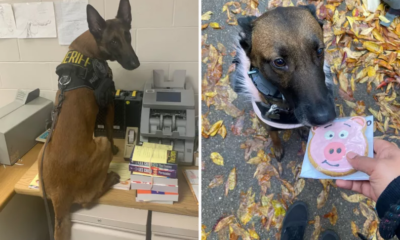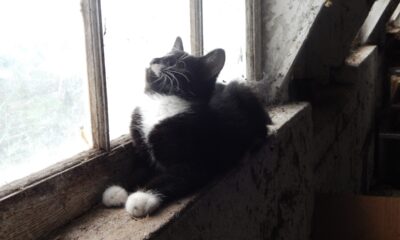Cute Animals
Ocean Plastic Finds New Life In Planters
Quick Smiles:
- Startup in Glasgow turns ocean waste into stylish, origami-like planters
- Pots are made from traceable plastic recovered from discarded fishing nets
- Each sale helps support marine cleanup efforts and sparks conversation
Discarded fishing nets, once a stubborn source of ocean pollution, are now blooming into beautiful new beginnings thanks to a creative startup based in Glasgow. The company, POTR, crafts eye-catching, geometric plant pots from plastic salvaged from abandoned marine gear, giving fresh purpose to ocean waste.
What makes these ‘ocean pots’ extra special is their traceability. Every planter boasts a QR code that reveals the journey of the plastic, letting plant owners learn exactly when and where the fishing net was retrieved. As founder Andrew Flynn puts it:
“Traceability makes it real for people.”
He shares, “The more transparent the journey, the more it sparks conversations and makes people realise they can be part of the solution.” Inspired by what he saw along Scotland’s west coast, Flynn teamed up with partners like Waterhaul, a Cornish group specializing in collecting marine waste. Together, they form a unique UK supply chain: nets are recovered and shredded in Cornwall, sent to Edinburgh for pressing and die-cutting, and then transformed into striking planters.
The positive impact is already adding up. According to studies, fishing and aquaculture industries generate around 6,000 tonnes of plastic waste each year in Scotland and England. Instead of floating aimlessly, each recovered tonne can become up to 5,000 new planters. POTR goes a step further, donating four percent of profits to ongoing ocean cleanup initiatives.
Another clever feature lies in the pots’ design: inspired by origami, they can be flatpacked for shipping, making transport up to 100 times more efficient and sustainable. Harry Dennis of Waterhaul celebrates the partnership, explaining:
“Ghost gear is the most damaging form of plastic in the sea. Working with POTR means we can take that material and turn it into something useful, something beautiful, something people want in their homes.”
This inspiring project reveals how even forgotten plastic can be part of a meaningful comeback story—bringing a touch of the ocean’s resilience into homes and helping seas thrive for future generations.

-

 Cute Animals2 years ago
Cute Animals2 years agoPuppy Love Patrol: Service Dog Swoons Over K9 Officer Neighbor
-

 Cute Animals2 years ago
Cute Animals2 years agoHugs, Hooves, and Happiness: Newborn Donkey Steals Hearts by Demanding Affection [Video]
-

 Cute Animals2 years ago
Cute Animals2 years agoWATCH: A German Shepherd’s Surprising Parenting Instinct for Lost Ducklings!
-

 Cute Animals2 years ago
Cute Animals2 years agoPetty Pup Pulls Off Hilarious Bone Heist [Video]
-

 Heroes2 years ago
Heroes2 years agoA Lost Dog’s Bark Leads to a Lifesaving Discovery
-

 Cute Animals2 years ago
Cute Animals2 years ago“Pure Love”: Adopted Rescue Dog Can’t Hide How Grateful He Is [Video]
-

 Cute Animals2 years ago
Cute Animals2 years agoTiny but Mighty: Cat with Dwarfism Becomes Internet Star as Owners Adapt Backyard for Her Comfort
-

 Cute Animals2 years ago
Cute Animals2 years agoAdorable Puppy Steals Hearts After a Tiring Swim [Video]